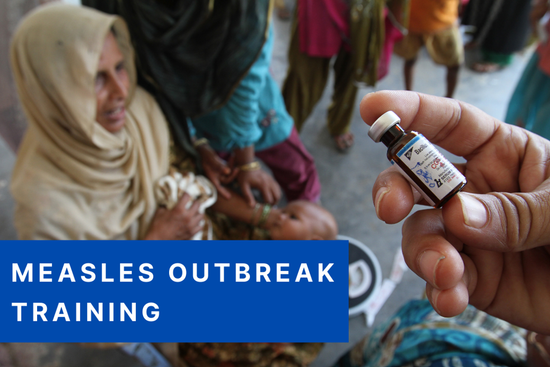
All health workers deployed to measles outbreaks must complete the measles and rubella (MR) training to implement quality interventions and work safely and effectively in the field. This course provides the essential preparedness, detection, investigation, response, and recovery skills required to contain the measles outbreak.
Photo credits: WHO / A. Reynolds
Idioma: English
Measles Rubella
Información del curso
This course is also available in the following languages:
Measles and rubella (MR) training is essential to supporting the implementation of quality interventions to help countries achieve and maintain measles and rubella elimination. This training introduces participants to WHO’s recommended approaches to measles outbreaks.
Course Duration: Approximately 3 hours.
Certificates: A Confirmation of Participation will be issued to participants who complete 100% of the course content. A Record of Achievement will be issued to participants who receive at least 80% across all graded assessments. Participants who receive a Record of Achievement can also download an Open Badge for this course. Click here to learn how.
Lo que aprenderá
- Describe measles disease and outbreak characteristics;;
- Explain the principles and components of measles outbreak preparedness that enable a rapid and effective response;
- Recognize the components of outbreak detection and confirmation process;
- Identify the components of measles outbreak investigation process;
- Recommend measles outbreak response strategies and processes;
- Implement strategies for improving health status of the outbreak-affected population, such as recovery structures coordination; recovery planning using best practices to improve vaccination coverage to close immunity gaps (focusing on zero-dose children) using the factors that contributed to the outbreak; and tools to support the recovery process.
Contenido del curso
Measles Outbreak Training: Introduction
Module 1: Measles disease and outbreak characteristics:
By the end of this module, you should be able to: identify measles disease and outbreak characteristics, such as measles scientific classification; clinical manifestations of measles; differential diagnosis of fever and rash; clinical course of measles; complications of measles; risk factors for measles; measles outbreak characteristics; and herd immunity thresholds.Module 2: Preparedness:
By the end of this module, you should be able to: ensure systems are established to enable a rapid, effective response to measles outbreaks.Module 3: Detection:
By the end of this module, you should be able to: detect and confirm measles cases to ensure proper case management and enable implementation of appropriate public health strategies to control further transmission.Module 4: Investigation:
By the end of this module, you should be able to: determine the cause and extent of measles outbreaks; identify potential measles contacts to target those at particular risk of disease for intervention; determine the source of infection, including who infected the individual and whether the infection was imported, importation-related, or endemic; identify populations and areas with low coverage and at higher risk of outbreaks that require enhanced vaccination efforts; and determine the reason for each measles case.Module 5: Response:
By the end of this module, you should be able to: interrupt measles virus transmission; reduce measles morbidity, mortality, complications, and sequelae; and identify root causes so that immunity gaps and/or system weaknesses can be addressed to reduce the risk of future outbreaks.Module 6: Recovery:
By the end of this module, you should be able to: identify strategies for improving health status of the outbreak-affected population, such as recovery structures coordination; recovery planning using best practices to improve vaccination coverage to close immunity gaps (focusing on zero-dose children) using the factors that contributed to the outbreak; and tools to support the recovery process.
Matricularme en este curso
Requisitos para el certificado
- Obtenga un certificado de estudios al obtener más del 80% del número máximo de puntos de todos los trabajos evaluados.
- Obtenga una confirmación de participación al completar al menos el 100% del material del curso.
- Obtenga una insignia digitale abierta al completar el curso.